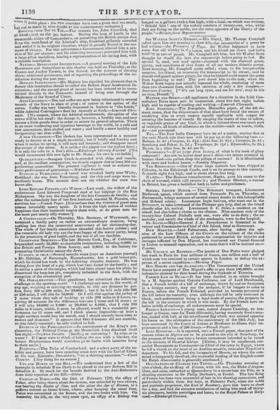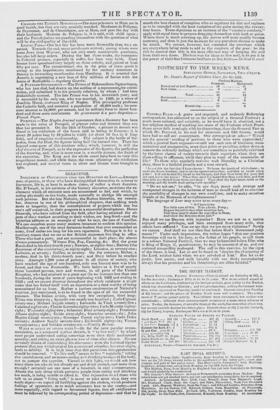SIERRA LEONE Mixon.— The Britomart transport, Lieutenant Birdwood, agent, which
arrived from Fernando Po, on Thursday, at
Portsmouth, brings accounts of several recent deaths in this inhospitable- and ill-fated colony. Lieutenant Ingle Sulivan, who went out in the Re;seseert, to take command of the Plumper gun brig, died on the island shortly after his arrival. Lieutenant S. C. Stiles, a resident on the island, had also fallen a victim to the climate. Nine marines only of the twenty-four Colonel Nicholls took out, were able to do duty ; the re- mainder, and nearly the whole of the mechanics, were in the hospital.
ST. Luciz.—Major-General .7. A. Farquharson is Gazetted as Go. vernor and Commander-in-Chief of this Island, fatal to Governors.
Doss MsatrEn.—Lord Palmerston, after having taken the opi- nion of the Law Officers of the Crown on the subject of the claims, preferred by several British subjects for compensation for injuries and outrages inflicted by Don Miguel, has instructed our Consul-General at Lisbon to demand reparation, and to state that it will be insisted on.— Courier.
MY UNCLE V. MY Bitorrma.—The jewels of Don Pedro were pledged last week in Paris for four millions of francs, one million and a half of which sum was remitted to certain agents in London to defray the ex- penses of a secret expedition.—Morning Paper.
Dow MIGUEL AND TICE Assznicaus.—The Government of the United States have accepted of Don Miguel's offer to pay them 100,000fr. as the indemnity claimed for their losses during the blockade of Terceira.
Flaxen LAW OF BILLS.—It has been decided, in an action brought by a M. Seguier against Captain Cochrane, son of Lord Dundonald,
that a French holder of a bill of exchange, drawn by and on foreigners in a foreign country, may sue the acceptor, if he happen to come to France, before the French Tribunal, provided lie became possessed of
the bill before its maturity, even although the bill be only endorsed in blank, such endorsement being a legal mode of passinat' the property in the bill in the country in which it was made. By the French laws re• lative to bills of exchange, all endorsements must be special.
Fasescu LOYALTY:A young man, named Jaques Castaing, an inn- keeper at Gujon, near La Teste (Gironde), having wantonly fired a mus- ket, loaded with ball, at the tri-coloured flag which was erected opposite his house on the celebration of the anniversary of the 29th July, has been sentenced by the Court of Assizes at Bordeaux to fifteen days' im- prisonment and a fine of 200 francs.— French Paper.
LATE IIONOIIRS.—It is reported, says a French paper, that part of the cannon taken at Algiers are to be granted to the city of Strasburg, for
the purpose of being cast into a bronze monument intended to be raised to the memory of General Kleber. [Kleber, it may be recollected, suc- ceeded Buonaparte as Commander-in-Chief of the army in Egypt, where he fell a victim to the hand of an Arabian assassin, soon after Napoleon's departure. To his fall, and the incapacityof Mellon, on whom the com- mand subsequently devolved, the successful landing Of the English under Sir Ralph Abercromby is generally attributed.]
OCCUPATIONS OF CHARLES THE TENTH.—On Thursday morning at nine o'clock, the ex-King of France, with his son, the Duke d'Angou- Igme, and suite, embarked at Queensferry in a steam-boat for Fife, on a shooting excursion to Sir Philip Durham's, at Fordel. The late King
of France has been very successful of late in his shooting excursions, and particularly within these few days, at Dalmeny Park, when the noble
and patriotic proprietor, the Earl of Rosebery, gave him leave to shoot for a day, and had the extreme satisfaction of seeing him send off thirty- six pheasants, besides partridges and hares, to the Royal Palace at Holy.. rood.—Edinburgh Courant. CHARLES THE TENTH'S Mtsusettes.—The state prisoners at Ham are in good health, but they are very carefully watched. Mesdames de Polignac, de Peyronnet, and de Chantelauze, are at Ham, and pass the day with their husbands. Madame de Polignac is, it is said, with child again ; and the French jurists are puzzling themselves with the question of what will be the civil quality of the child.
Leresie FAIR.—Our last fair has been more favourable than was ex- pected. Towards the end, many purchasers arrived ; among whom were some Jews from 'Warsaw, who not only made considerable purchases, but also left large orders. During the last three weeks, the commerce in Colonial produce, especially in coffee, has been very brisk. Many houses have speculated very largely on those articles, and gained at least fifty per cent. The extraordinary rise in the price of these goods is owing to the impediments occasioned by the sanitary measures in Saxony in forwarding merchandise from Hamburg. It is asserted that Austria is negotiating a new loan of fifty millions of florins with the house of Rothschild.—Augsburg Gazette.
A PATTERN GOVERNMENT.—The Prince of Hohenzollern-Sigmaringen, who has just died, had drawn up the outline of a representattive consti- tution, and submitted it to his princely relatives, by whom i had been disdainfully scouted. The late Prince was in his seventieth year; and is succeeded by his only son, who was married, in 1808, to a niece of JoaChini Murat, ci-devant King of Naples. This principality professes- the Catholic faith, and contains a population of 40,000 souls ; its reve- nues amount to 34,0001. per annum, and its military force to three hun- dred and three score combatants. Its government is a pure despotism.—
French Paper. - POMPE1I.—The Naples Journal announces that a discovery has been made in the ruins of Pompeii, of gfeater value and interest than any that has preceded it. On the 24th of October, a picture in mosaic was found in the triclinium of the house said to belong to Faustus : it is about 20 palms long by 10 palms in width (or about 18 feet by 9 Eng- lish), and of exquisite workmanship. The subject is the battle of Sar- pedon, from the Iliad, the figures being half the natural size. Time has injured some parts of this precious relic ; which, however, is still the chef d'reurre of Pompeii, as to the expression of the figures, the perfection of the drawing, and, what is more rare in a marble picture, the finish of the execution. The King and the whole court have been to view this magnificent mosaic, and while there, the room adjoining the triclinium was explored, and several vases iu silver and bronze were brought to ight.



























 Previous page
Previous page